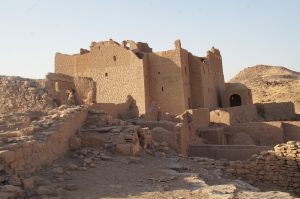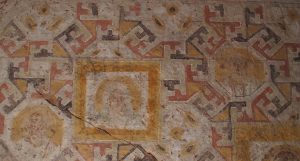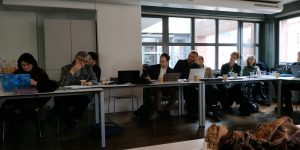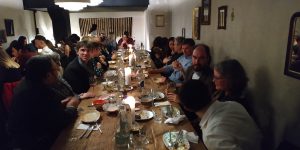The workshop was organized by Stefanie Schmidt.
From their website:
“For roughly a century, alternating teams have been devoted to the archaeological exploration of the Nile island Elephantine in the south of Egypt, the city of Aswan (Roman Syene) on the opposite east bank, the neighbouring monastery of Anba Hadra, as well as the Qasr Ibrim settlement and fortress in Lower Nubia. Field research has yielded a multitude of papyri, ostraca and inscriptions, which have in part not all been published to this day. The edition and publication of these texts depends on the work of philologists from all over the world, associated with various excavation and museum teams.
Up until this moment, text editors have not had the opportunity to compare notes with colleagues from related excavations and projects. In December, our workshop “ConText. Greek, Coptic and Arabic Sources from Aswan, Elephantine, Dayr Anba Hadra and Qasr Ibrim”, taking place at the University of Basel (Switzerland), will provide this opportunity. All the texts to be presented and discussed originate from Roman, Byzantine and Islamic times. In cooperation with leading archaeologists of the region, in work groups we will discuss economic, administrative, and cultural processes of change between a Roman-Byzantine and a Byzantine-Islamic society at the First Cataract.”

Dayr Anba Hadra. View of the qasr.
I was invited to provide an archaeological/historical background to Dayr Anba Hadra, the large monastery on the west bank of the Nile. Since 2014, I am a member of the German project “Deir Anba Hadra (Simeonskloster), ein mittelalterliches Kloster auf dem Westufer von Assuan“ (Freie Universität Berlin/Excellence Cluster TOPOI/German Archaeological Institute (DAI), under the direction of T.S. Richter).

Painted ceiling of the “cave of Anba Hadra”. According to tradition, Anba Hadra has lived here.
This monastery with its wall paintings is also a key monument in our Polonez project. It is the best preserved monastery in southern Egypt with wall paintings in the church and in various monastic buildings.

Photograph: Andrea Hasznos
The workshop was very well organized (thanks Stefanie!) and we had extensive and enthusiastic discussions (continuing long after working hours) ending on Saturday night at the Basel Christmas market with Glühwein (unfortunately without snow).
We look forward to a follow-up workshop!

Photograph: Andrea Hasznos
